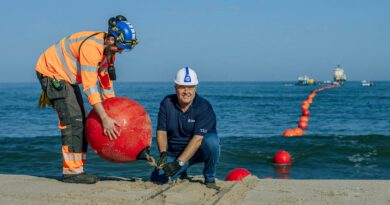Amended telecoms bill headed to cabinet
Siyabonga Cwele
A redrafted version of the Electronic Communications Amendment Bill will be presented to cabinet by the end of next month, a move that could finally take South Africa a meaningful step closer to awarding new radio frequency spectrum to telecommunications operators.
That’s the word from Siya Qoza, the spokesman for telecoms & postal services minister Siyabonga Cwele, who said the amended bill — once approved by cabinet — will be sent to parliament for further debate. He said the telecoms department has finalised various amendments to the controversial bill following a robust engagement with industry role players earlier this year.
The next step is to present the amended bill to cabinet. “That will most likely happen by September,” Qoza said.
It’s still not known, however, how much spectrum will be reserved for government’s planned wholesale open-access network (Woan) or whether a “hybrid model” — proposed by the big mobile operators in which they agreed to support the Woan in return for exclusive-use spectrum rights — will be adopted. A report by the CSIR on how much spectrum the Woan would need to operate has still not been made public and is only likely to see the light of day after cabinet has weighed in on the issue, Qoza said. The CSIR report was prepared at the Cwele’s request.
Government has drawn heavy fire over the amendment bill, with Vodacom CEO Shameel Joosub describing it as the telecoms industry’s “mining charter” at a telecoms department workshop, which was held in Pretoria in early March. Joosub was referring to the charter that has led to investor uncertainty and undermined investment in the mineral resources sector.
“This for us is a crisis,” Joosub told representatives from the department of telecoms & postal services, led by director-general Mabuse Nkuna. Not mincing his words, Joosub warned government that the bill was already scaring away investors. MTN South Africa CEO Godfrey Motsa voiced similar concerns.
Vodacom and MTN — along with the Free Market Foundation, Research ICT Africa, the GSM Association and others — have skewered government’s plan to reserve the majority (if not all) so-called “high-demand” spectrum (used for mobile broadband) for the Woan and for threatening to take away spectrum already assigned to the operators. Telkom and Cell C have said the Woan idea makes sense, with Telkom arguing that the Woan should get all unassigned mobile broadband spectrum.
Joosub warned that taking away the operators’ spectrum would amount to expropriation. “The impact of this is investment will slow down. When telcos invest, they invest for the long term. The minute you start to talk about returning spectrum, it makes the entire network useless.”
No to ‘dominant’ Woan
He said it was urgent that operators be granted access to new spectrum. “The industry hasn’t had (new) spectrum in 14 years,” he said at the department’s workshop. This means operators were having to reallocate spectrum and build additional base stations to increase the density of coverage. Additional spectrum would lessen the need for new sites and drive down the cost to carry network traffic, and hence the price per megabyte paid by consumers, Joosub added.
Vodacom, MTN and others have cautioned against the creation of a so-called “dominant” Woan as well as government’s plan to force operators to open their networks to rivals on a cost basis using open-access principles.
The redrafted amendment bill, which will introduce sweeping policy changes to South Africa’s telecoms industry, will set out the conditions for the licensing of the Woan, create a framework for the rapid deployment of ICT infrastructure and seek to reduce infrastructure duplication, Qoza said.

Vodacom Group CEO Shameel Joosub
South Africa has still not technically awarded spectrum to operators to build 4G networks. Instead, the companies have reallocated spectrum originally assigned for 2G and 3G services to deploy 4G networks.
In a recent interview with TechCentral, Joosub urged government and the regulator, Icasa, not to wait for current policy discussions to be concluded before awarding 5G spectrum licences. He warned that South Africa risks falling further behind the rest of the world if 5G spectrum — some of which is vacant and unused — is not allocated as soon as possible.
“I wouldn’t like to see an environment where we are pushing 5G out by a couple of years,” he said. “I think our modus operandi has always been that we are at the cutting edge and our networks are comparable to the best in the world. So, I would license it (5G spectrum) and it would take a bit of the pressure off the digital migration.”
The delays in migrating broadcasters off analogue to more “spectrally efficient” digital platform is also having a negative impact on the roll-out of new broadband infrastructure. The “digital dividend” spectrum that will be freed up in the 700MHz and 800MHz bands once digital migration has been completed will be reassigned for mobile broadband, as it has been elsewhere in the world. These spectrum bands are well suited to providing better coverage in the cities, especially in-building coverage, and rolling out 4G infrastructure more affordably in rural areas.
South Africa is more than three years past the deadline agreed to with the International Telecommunication Union, an agency of the United Nations, to complete the migration from analogue to digital terrestrial television.
“We have fallen way behind in terms of the availability of the correct spectrum for 4G,” Joosub said. “What the industry has done is re-farm spectrum and tried to optimise as much as possible using the latest technologies available in what is a spectrum-starved environment.”
He warned that South Africa now is at real risk of falling behind the rest of the world. “When we launched 2G and 3G, we were at the cutting edge: we were among the first networks in the world to adopt these new technologies. I’m worried we’re still debating 4G and 5G is on the horizon.”
‘We have run out of spectrum’
Vodacom Group chief technology officer Andries Delport said at a media conference earlier this month that the operator is unable to expand its 4G network in rural areas because it simply does not have the spectrum it needs to do so at an affordable cost.
This coverage could be driven much higher, in a short space of time, if the company had access to spectrum below 900MHz, Delport said.
He said Vodacom has about 4 700 base stations in rural areas providing 95% of the population in these areas with speeds in excess of 1Mbit/s. But about a million South Africans live in areas where speeds are sub-1Mbit/s.
“4G coverage in metro areas is around 91% of population, but it’s only 44% 4G population coverage in rural areas,” he said. “When do we run out of spectrum? We have run out of spectrum. If you look at the 44% rural coverage on 4G and the reason we cannot expand it, it’s because we don’t have spectrum.”
Delport said that if Vodacom had access to the 800MHz band, it would, “in a space of months”, be able to dramatically expand 4G coverage in rural areas.
To deliver faster Internet speeds in rural areas, Vodacom — and rival MTN — have been actively rolling out 3G using the 900MHz band (originally used exclusively for 2G voice). The band is better suited to building sites with large coverage areas, making it more affordable in rural areas where the network can be less dense. — © 2018 NewsCentral Media
Source: techcentral.co.za



